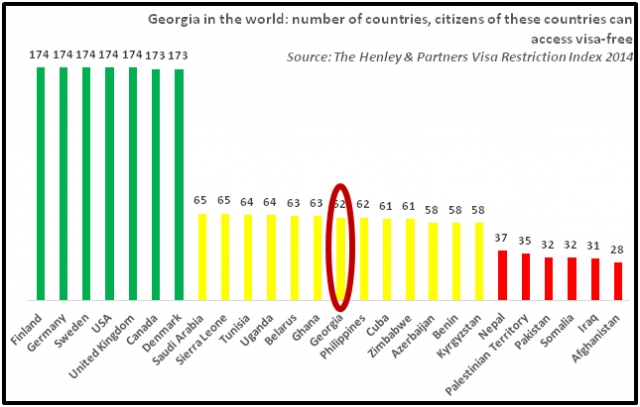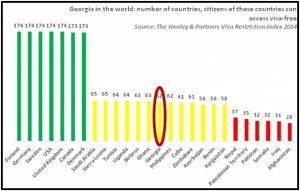Europe Wants Georgia. But Not Georgians
From the ISET Economist Blog (www.iset.ge/blog)
In March 2015, 31-year-old Tamar Trapaidze died of severe toxicity in Italy. Like many Georgian women of her generation, Tamar was an illegal immigrant employed as an in-home care worker by an Italian family. Being “illegal”, she must have feared deportation, which is probably why she was unable to receive adequate medical treatment.
Despite all the risks it entails, illegal immigration is a key survival strategy for many Georgian families. Since 2002, presumably the best period in Georgia’s recent history, the country has lost 14.7% of its population, mostly due to emigration. Remittances by Georgians abroad currently constitute 9% of the country’s GDP (as compared with only 2% in 2002), with the share of EU countries constantly on the rise (30% in 2014, mostly from Greece and Italy).
These facts are widely appreciated. What is less well understood, however, is that legal access to the European labor market represents the only channel for a tangible and immediate improvement in the lot of ordinary Georgian people (as opposed to those privileged few employed by Western-financed NGOs).
…legal access to the European labor market represents the only channel for a tangible and immediate improvement in the lot of ordinary Georgian people.
Just how crucial free labor mobility is for EU’s eastward expansion could be easily understood from the angry reactions by politicians in Slovakia, Poland and Hungary to the suggestion by David Cameron that the UK may take a tough stance on migration when re-negotiating Britain’s EU membership terms. FT’s headline this week tells it all: “UK warned by east Europe not to meddle with migrant rights”.
Access to the EU labor market is much more critical for countries in the less industrialized Black Sea region, such as Bulgaria and Romania. For example, according to one estimate, “3 million Bulgarians had left the country in the past 23 years and stayed away – a momentous demographic change for a country with a population now slightly above 7 million”.
The promise of visa-free short-term travel to Europe (which implies improved access to lucrative EU jobs, legal or illegal) is even more of a temptation further to the east, in Georgia and other predominantly agrarian Eastern Partnership countries.
Unable to deliver any visible economic improvement, Georgian politicians are not shy about the importance visa liberalization for the country’s future (and, by implication, their own political survival). In a rare moment of unity, Georgian President Giorgi Margvelashvili, PM Irakli Garibashvili and Parliament Chairman Davit Usupashvili have recently called on the EU to make an “unambiguous endorsement of visa-free regime” with Georgia at the Riga Summit. “For Georgians,” they write, “visa liberalisation will provide a long-awaited tangible reward and encourage renewed reform efforts.”
To fully appreciate the importance of visa liberalization for Georgia one has to understand that any other benefits potentially associated with the EU – agricultural subsidies, infrastructure investment and access to the EU market – will not materialize any time soon, or not at all.
The Deep and Comprehensive Free Trade Agreement (DCFTA), which Georgia and the EU signed last June, is a good case in point. As argued by Joe Stiglitz, DCFTA and other similar “partnership agreements” are tailored to EU (or US) corporate interests. They “go well beyond trade, governing investment and intellectual property as well, imposing fundamental changes to countries’ legal, judicial, and regulatory frameworks, without input or accountability through democratic institutions.”
For a fully-deregulated economy, such as Georgia’s, going through the legalistic nightmare implied by the process of harmonization with EU’s legal and institutional systems represents a step back, not forward, in terms of creating a business-friendly environment (and, ultimately, jobs).
It is not clear whether Georgia has anything to export to the EU (under the DCFTA) that it is not already exporting (under the GSP+ regime). At the same time, the burden of new regulations (often rushed through the Georgian parliament in a hasty and thoughtless manner) concerning e.g. TV advertising, migration and labor legislation, anti-trust, energy and environment (to name just a few) is already hurting the Georgian economy.
Crucially, the observed lack of government capacity to tailor EU-style regulations to the Georgian context – a relatively simple task – should serve as a wake up for anybody thinking that their practical implementation will benefit Georgian businesses and society. If anything, these regulations are very likely to create red tape, increase producers’ costs (and consumer prices), increase corruption risks and undermine Georgia’s international competitiveness.
This brings us back to the point we have made earlier.
If the EU wants to get serious about bringing Georgia, Ukraine and, perhaps, other Eastern Neighborhood countries into the European family of nations, it should reconsider its stance on the question of visa liberalization. Yet, apparently this is not going to happen.
WHO IS LOSING GEORGIA?
On May 8th, European Commission issued the third report on the implementation of the Visa Liberalization Action Plan (VLAP). To cut the long story short, despite the Georgian government’s rush to tick off the boxes on labor and migration legislation, Georgia was not able to complete all the VLAP requirements. Georgian citizens will definitely have to wait at least another year to be able to travel to Europe visa-free.
As reported by Civil.ge, Angela Merkel’s speech, delivered on 21, May ahead of the EU Eastern Partnership Summit in Riga, represents a clear attempt to manage expectations. “Visa-free travel rules for citizens of Georgia and Ukraine … will only be possible once all requirements are met”, she said. Most importantly, she emphasized that Eastern Partnership “is not an instrument of the EU’s enlargement policy”, adding that the EU should not trigger false expectations of its Eastern partners in this regard.
As Davit Usupashvili put it, “the smaller the country, the smaller is its right to be disappointed”. Yet, right or wrong, disappointment is a function of expectation. Great expectations, as was the case in Georgia, will inevitably bring about great disappointment with the EU and Georgia’s general direction.
According to CRRC Georgian Barometer data, Georgian people’s trust towards the EU has been declining since 2008 (from 54% “fully trusting the EU” to only 33% in 2013). In parallel, a recent NDI poll (released on May 11) suggests that “although the majority of respondents remain in favor of Euro-Atlantic integration, support for joining the Russia-led Eurasian Union seems to be increasing. 31% of respondents said they “approve” if Georgia joins the Eurasian Union.” Importantly, the three most recent NDI surveys indicate an upward trend: from 11% in November 2013 to 20% in August 2014, to 31% in May 2015.
AND WHO GAINS?
To paraphrase Sweden’s former Foreign Minister Carl Bildt, while the EU is making Georgia offers it cannot properly understand, Putin’s offers are increasingly difficult to refuse.
As discussed in a recent article by Sergi Kapanadze, Russia’s “soft power” has been on the rise since late 2012. Abashidze-Karasin discussions led to progress on many fronts. Russia simplified the process of issuing visas for Georgian citizens, and the Russian labor market opened for another wave of Georgian labor migration. The ban on Georgia’s imports was lifted by mid-2014, resulting in the resumption of wine and mineral water exports to the Russian market, and a very substantial increase in the price of grapes (a great boon for Georgian farmers). Tourism from Russia has been growing very fast in 2013 and 2014 thanks to regular flight connections established between Tbilisi and an increasing number of Russian cities. Russian investment, partnerships in the energy sector, and planned infrastructure projects are all indicators of Russia’s growing presence and attraction as an economic partner, according to Kapanadze.
* * *
EU’s failure to accommodate Ukraine and Georgia’s demands for visa free travel and, eventually, access to the EU labor market must be understood in the broader context of Europe’s migration crisis. As discussed by Kenneth Rogoff in “Inequality, Immigration, and Hypocrisy”:
“Allowing freer flows of people across borders would equalize opportunities even faster than trade, but resistance is fierce. Anti-immigration political parties have made large inroads in countries like France and the United Kingdom, and are a major force in many other countries as well….
With most rich countries’ capacity and tolerance for immigration already limited, it is hard to see how a new equilibrium for global population distribution will be reached peacefully. Resentment against the advanced economies, which account for a vastly disproportionate share of global pollution and commodity consumption, could boil over.”
Nino Doghonadze & Eric Livny












